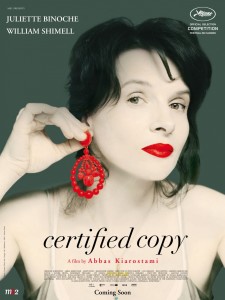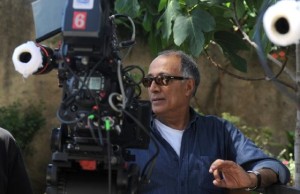Cinema Revisited: Certified Copy and the Subjectivity of Art

The theatrical release poster for “Certified Copy.”
Certified Copy is a very unique movie, it is confusing, but in a good way, and it’s a hard film to talk about since almost any information given could be considered a spoiler. Let me start off with what I can tell you without giving too much away. The film was written and directed by Iranian filmmaker Abbas Kiarostami, and stars Juliette Binoche and William Shimmel; it takes place in Florence Italy, where James (Shimmel) is leading a discussion of his newly released book, “Certified Copy,” in which he gives his views on art and how we interpret it. Elle (Binoche) is at the discussion with her son, but soon has to leave because he is bored and wants something to eat. The next morning, James visits her at her antique shop and they decide to take the day and go do whatever sounds good. They end up visiting an art museum, a wedding, a café, and a few other places all while talking about art, love, and life. This is really as a far into the story as I can take you, a lot of things are discussed and revealed on this trip, but what happens and how it happens are what makes this movie unique and special.
As mentioned earlier, James’ book is full of his ideas of art and how we interpret it. During the book discussion, we learn that he believes the copy of an artwork carries the same impact and significance as the original. He says later in the movie that “It’s not the object that matters, it’s your perception of it.” He gives an example of the “Mona Lisa” in saying how seeing a copy of the real painting can still carry the same impact. He goes further in saying how even the original painting is a recreation and how the “real” original is the actual woman in the painting.
There are some interesting thoughts brought up on the subjectivity of art throughout the film; anyone can see art and beauty in anything. What someone considers a masterpiece, another might consider a disaster. Art is obviously very personal, and that’s what art is all about, it’s about our own personal interpretation of something and what it means to us. Our perception is really the basis on how we watch Certified Copy. What we perceive isn’t always what’s real, but then again maybe it is, or like the film states, does it really matter? We are affected the same way nonetheless aren’t we? It’s very interesting to watch the film play out, what seems to be a very simple story on paper, turns out to be something more than we could have imagined.

The writer/director/producer Abbas Kiarostami on the set of “Certified Copy.”
The themes of art, love, and even philosophy are wonderfully tied into James and Elle’s discussions throughout the day, these are two interesting and well-developed characters who have well-defined views on all these areas of life. Sometimes they agree, and sometimes they don’t, but their discussions are what bring so much life to this movie.
This brief discussion of the film could be comprised almost entirely out of questions. In fact, in the end, that’s really all were left with, but that’s satisfying enough. The film would have done itself a disservice had it attempted to answer any of these questions, doing that would have taken away from the personal experience of each person who has seen (or will see) it. The film keeps things open, allowing for each person to perceive it however they would like. Certified Copy fits in with its own philosophy, in that the movie itself is not what matters, it’s our own personal perception of it.


